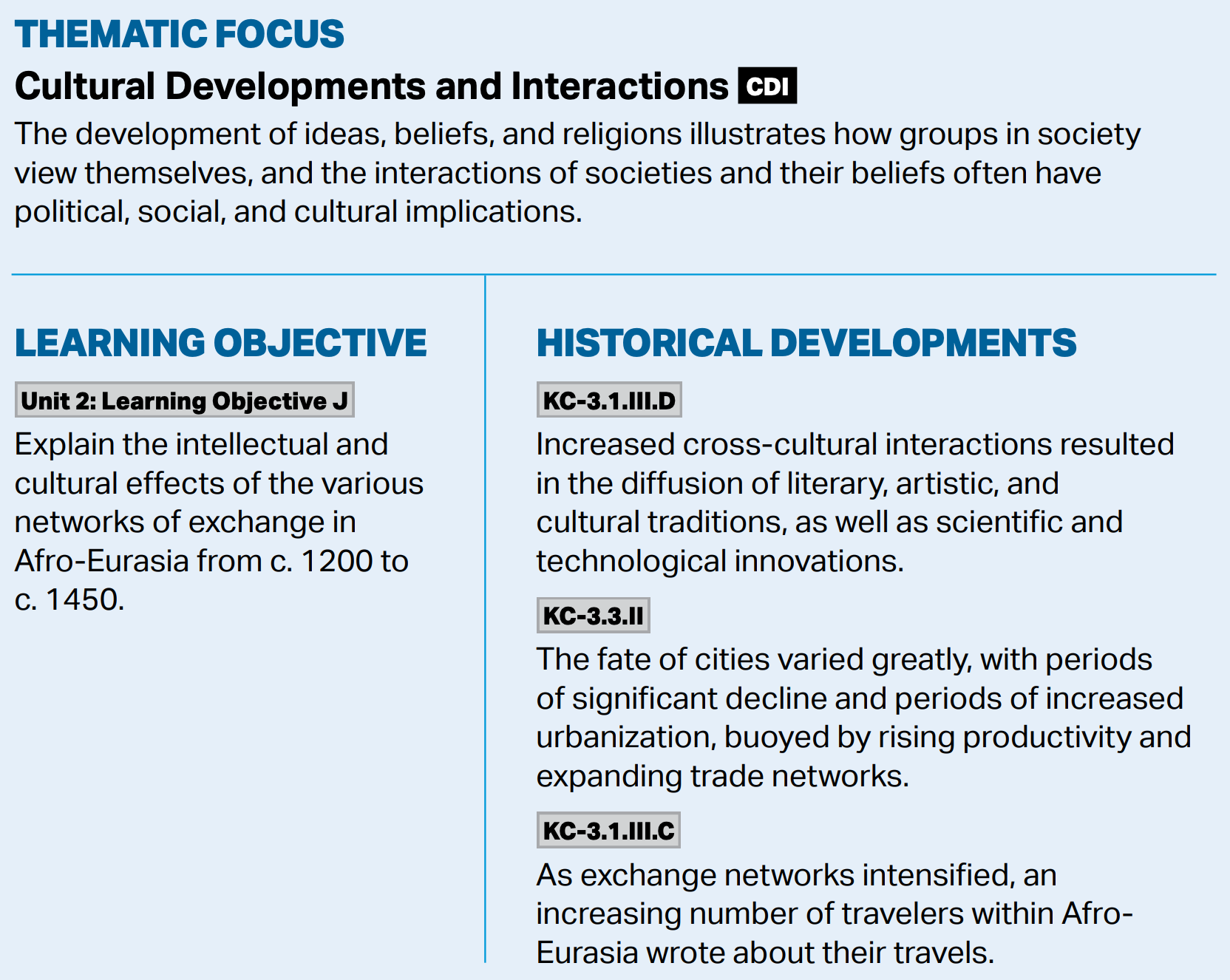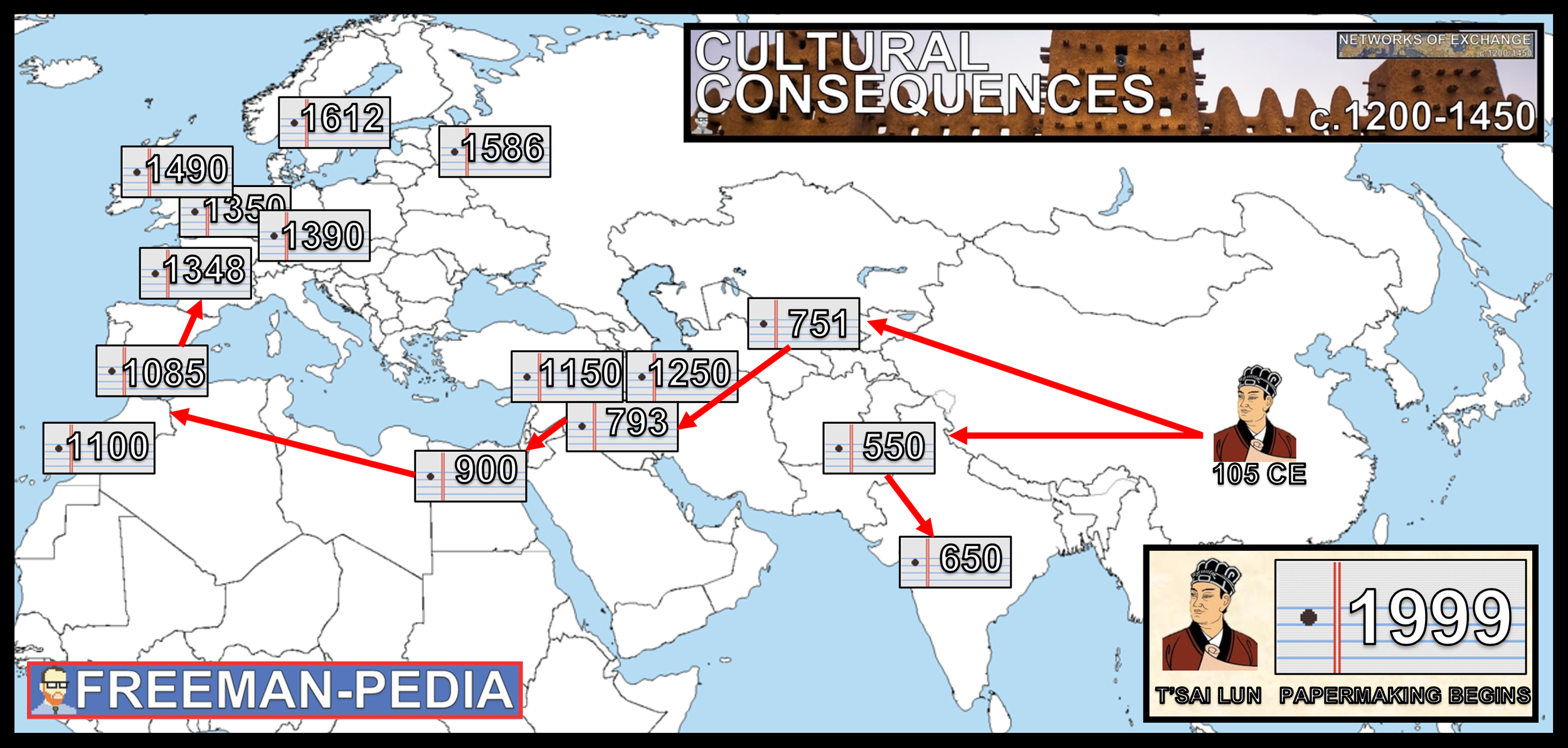With all of this trade going around during the NETWORKS OF EXCHANGE period (1200-1450), there were bound to be MASSIVE cultural consequences. The College Board only mentions a couple, but I’m sure your teacher will come up with more. Religions, languages, sciences, math, technology, etc etc etc. This is the section where they mention the world travelers by name: Ibn Battuta, Marco Polo and Margery Kempe. The Network of Exchange was not just political; below you can see the Cultural Consequences…
1. IBN BATTUTA
2. MARCO POLO
3. MARGERY KEMPE
4. BATTLE OF TALAS
5. PAPERMAKING
6. DAR AL ISLAM
7. GUNPOWDER
8. COMPASS
9. PAX ISLAMICA
10. SPREAD OF BUDDHISM
The SPREAD OF WORLD RELIGION (This covers all of time but is kind of cool to watch).
ISLAM (from CRASH COURSE World History)
MARGERY KEMPE (from the BRITISH MUSEUM)
HISTORY OF PAPERMAKING (OK. I’m kind of obsessed with how Paper is pronounced in Chinese and they keep saying it over and over.)
HISTORY OF GUNPOWDER (from TEDEd)
MARCO POLO
IBN BATTUTA
1. TRAVELS OF MARCO POLO, c. 1300, Marco Polo (VENICE)
2. A Gift to Those Who Contemplate the Wonders of Cities and the Marvels of Travelling, 1355 CE, Ibn Battuta (MOROCCO)
3. TARIKH-I-JAHANGUSHAY, c. 1280 (Persian chronicler recounts Hulegu Khan’s efforts to procure gunpowder prior to the siege of Baghdad in 1258), Ata-Malik Juvayni (BAGHDAD, ILKHANATE)
4. GALLE TRILINGUAL INSCRIPTION, c. 1409, Zhenghe (SRI LANKA)
5. The Book of Margery Kempe, c. 1438, Margery Kempe (ENGLAND)
1. BATTLE OF TALAS, UNKNOWN (Battle where papermaking transferred from Tang China to the Abbasids)
2. JIKJI, 1377 CE, (GORYEO) (Oldest Extant book printed using metal movable type)
3. GUTENBERG BIBLE , c. 1450 (GERMANY)
4. HEILONGJANG HAND CANNON, 1298, (CHINA) (Oldest extant firearm)
5. DE NOBILITATIBUS SAPIENTII ET PRUDENTIIS REGUM, 1326, Walter de Milemete (earliest depiction of European use of gunpowder) (ENGLAND/FRANCE)
1. Trade routes aren’t just highways for trading stuff.
2. As people from different places run in to one another, they will share stuff from their cultures.
3. Big takeaway here: Religions spread (Islam, Hindu, & Buddhism). Tech spreads (Mostly Chinese stuff making it’s way to the west).
4. People have traveled before this. BUT, they didn’t write much down. Two prolific travelers: Ibn Battuta and Marco Polo. One religious pilgrim: Margery Kempe
5. As cultural stuff spread, it altered from its original form (Islam in Mecca is different than Islam in Timbuktu… Same for Buddhism in Central India vs. Northern Japan) This is called Syncretism.




















